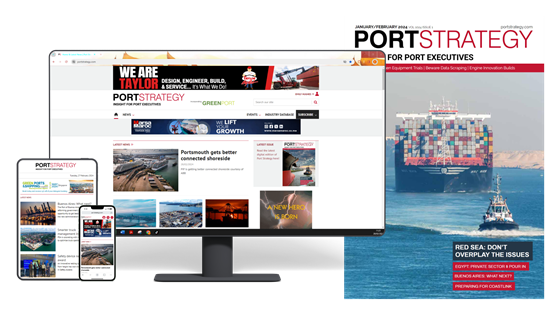Operations News – Page 152
-
News
Bringing dredging waste back to life
With growing concerns regarding the environmental impact of dredging waste, Virotec believes there is increasing scope for its ViroSoil technology - one of a range of solutions developed for the treatment of contaminated soils and waters.
-
News
The Blame Game
Environmental concerns are impacting on how ports in the EU dispose not only of ship borne waste, but also of contaminated sediment. Alex Hughes reports
-
News
Waste not, want not
Regulations within the European Union make it incumbent on ports to provide facilities to manage waste discharged by visiting ships. The Port of Tyne levies a standard mandatory charge on all vessels, which finances the deployment of 1,100-litre wheelie bins into which all general waste has to be deposited.
-
News
Thames tidier carves out waste niche
A clean slate: keeping the River Thames tidyAccording to port environmental officer Alasdair Kerr, the port authority treats all waste as though it were Category I Food Waste, which effectively means disposal has to be strictly managed. For example, the contents of each wheelie bin are fed into a compactor, ...
-
News
Don't forget fenders in the planning stage
Poor planning and a fundamental lack of understanding of the lead times needed to supply fenders means that there is a constant pressure to meet delivery times, according to Simon Redford, business development manager for FenderCare.
-
News
Testing the technological waters
The marine market is cautious in adopting new technology and Mooring Systems'' MoorMaster automated mooring products represent a significant change, says MSL managing director Peter Montgomery.
-
News
Protecting quay interests
Would you buy the cheapest container crane with all the features taken off? Probably not.So why are fenders so often seen as a last-minute, bolt-on extra? Felicity Landon reports
-
News
Green goals
The largest ports in the US are setting the national tone with a comprehensive environmental roadmap for the future. David Foxwell reports
-
News
All-round storage solution
You have a new customer, they need quayside storage capacity - and you need a building, quick.Felicity Landon finds out why fast-erection, portable buildings are often the answer
-
News
Ticking the storage boxes
When it comes to storage, ports are all seeking the same thing: a sturdy, weatherproof facility at minimum cost and disruption, according to Amanda Clarkson of Collinson, BestHall''s UK representative. "They want a storage space uninterrupted by stanchions to enable free movement of forklift trucks, etc. Some want a controlled ...
-
News
More than just a structure
The Rubb team considers all the relevant factors when planning a new project, as illustrated in the recent design and construction of a new warehouse for Sprague Energy, says spokesman Ian Patterson.
-
News
Running out of rubber
A widespread tyre shortage is really starting to bite and terminal operators are left with few options when the black stuff wears thin. Alex Hughes reports
-
News
Uncertain supply dogs Salerno
Salerno Container Terminal (SCT), which mainly uses 18.00/33 and 18.00/25 radial tyres, is faced with an uncertain supply of industrial tyres, according to managing director Frans Jol. "As an example, I would point out that it is not currently possible to buy any new tyres before next year, basically because ...
-
News
Craning for a better view
China may house the price leaders in the manufacture of quayside gantry cranes but the technical forefathers are still found in Europe. Alex Hughes headed west to find out what operators can expect in the near future
-
News
Testing the outer limits
Europe''s crane manufacturers are increasingly delivering equipment with wider reaches, but the ceiling is far from being hit, as Alex Hughes finds out
-
News
Lower lead time a boon for users
The average lead time for a quayside gantry crane is now in the region of 15 months, a period that Gerry Bunyan, sales and marketing manager for Liebherr''s container cranes division, believes is more than satisfactory for the industry.
-
News
Eating into the Bottom Line
Accelerated low water corrosion is becoming more widespread in sheet piling. David Foxwell looks at the latest thinking on how to tackle port nasties
-
News
Alternative to ultrasonics
Visual inspection and ultrasonics may be the most used forms of inspection for ALWC,but RTD Group also recommends RTD INCOTEST (which stands for INsulated COmponent TEST), a unique corrosion survey method that allows ferrous objects to be surveyed without the need to make contact with the surface. This means that ...
-
News
Multi-dimensional
Apart from issues such as water depth and hinterland connections, there are a number of important constraints on development that need to be considered before transitioning to a multi-purpose terminal.These include: ● The lengths and specifications of berths for vessel types that will use the terminal ● Is a ro-ro ...
-
News
Widening the Parameters
The rationale behind becoming a ''multi-purpose''terminal rather than a single purpose terminal is obvious, but David Foxwell finds that the process is not as straightforward as it might seem





















